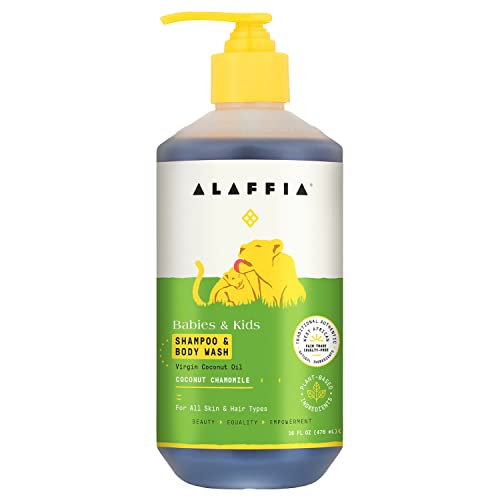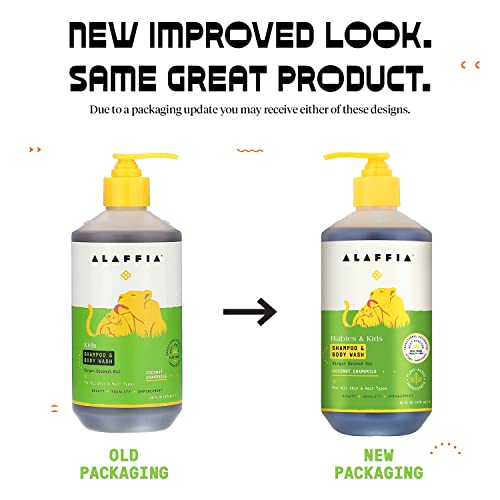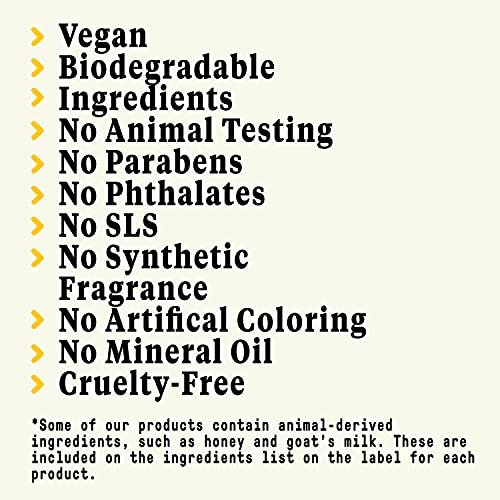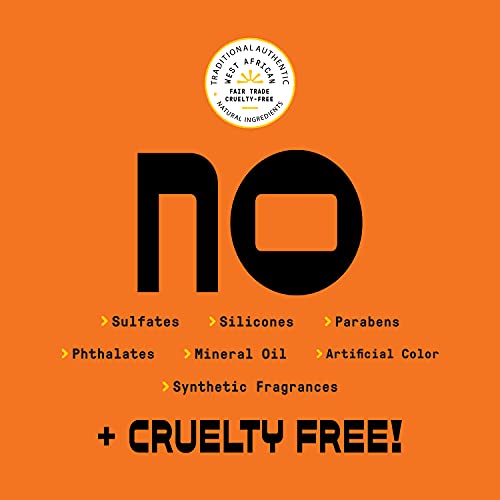




Alaffia Kids Shampoo & Body Wash - Gentle Care with Coconut & Chamomile, Fair Trade - 16 Fl Oz


Achillea Millefolium (Common Yarrow) Extract
Medium RiskAchillea millefolium extract, commonly known as common yarrow extract, is derived from the flowering plant Achillea millefolium. It is used in cosmetic formulations for its various properties, including soothing and anti-inflammatory effects.
Sustai Insights
Achillea millefolium extract offers functional benefits such as skin soothing and potential anti-inflammatory effects, which can enhance product efficacy. It is generally considered low risk for carcinogenicity and developmental toxicity, while showing moderate concerns for allergies. Environmental risks are also low, with no evidence of bioaccumulation. Regulatory bodies have not placed significant restrictions on its use. Safe practices should still be observed due to moderate allergenic potential, and alternatives may be considered for those with sensitivities. Overall, the risk level associated with this ingredient is medium.
Lauryl Glucoside
Low RiskLauryl glucoside is a sugar- and lipid-based surfactant commonly used in personal care products. It functions as a mild cleanser and emulsifier, helping to solubilize oils and dirt while contributing to product texture and stability.
Sustai Insights
Lauryl glucoside offers functional benefits as a gentle surfactant that effectively cleanses without harshness, and it is biodegradable, indicating sustainable sourcing. Health risks are minimal, with low concerns for carcinogenicity and low to moderate potential for irritation or allergies. Environmental risks are also low, with no significant pollutant or bioaccumulation concerns. Regulatory bodies have not issued specific warnings. Overall, it is assessed as low risk, suitable for use in various formulations, making it a viable option for those seeking safer alternatives.
Cocos Nucifera (Coconut) Water
Low RiskCocos Nucifera (coconut) water is an aqueous extract derived from the fruit of the coconut palm. It is commonly used in cosmetic and personal care products for its hydrating and soothing properties. Coconut water is rich in electrolytes and nutrients, making it a popular ingredient in formulations aimed at hydration.
Sustai Insights
Coconut water provides effective hydration and possesses antioxidant properties, contributing to skin health. It is sustainably sourced and biodegradable, enhancing its environmental profile. Health risks are minimal, with low concerns for carcinogenicity, allergies, or reproductive toxicity. Regulatory bodies do not impose significant restrictions on its use, marking it as a low-risk ingredient. Safe usage practices recommend using it in formulations designed for topical application, with alternatives including aloe vera for similar hydration benefits.
Decyl Glucoside
Low RiskDecyl glucoside is a glucose-based surfactant derived from natural sources, primarily used as a mild cleansing agent in personal care products. It effectively reduces surface tension, allowing for improved mixing of ingredients and enhanced cleansing properties without stripping natural oils from the skin.
Sustai Insights
Decyl glucoside offers functional benefits as a non-ionic surfactant, making it suitable for sensitive skin formulations. It is biodegradable and derived from renewable resources, supporting sustainability. Health risks are primarily low, with minimal concerns regarding irritation and allergies. Environmental risks are low, as it does not significantly contribute to pollution or bioaccumulation. Regulatory status is generally favorable, with low restrictions noted. Overall, decyl glucoside presents a low risk for use in consumer products, making it a suitable choice for gentle formulations.
Cocos Nucifera Fruit Extract
Low RiskCocos Nucifera Fruit Extract is an extract derived from the fruit of the coconut palm, commonly used in cosmetic formulations for its moisturizing properties. It serves primarily as a skin conditioning agent, contributing to product texture and hydration.
Sustai Insights
Cocos Nucifera Fruit Extract offers functional benefits such as effective skin hydration and conditioning, with sustainable sourcing potential. Scientific assessments indicate low health risks, including minimal concerns for carcinogenicity, allergies, and reproductive toxicity. Environmental impacts are also low, with no significant bioaccumulation or pollution concerns. Regulatory bodies do not impose restrictions on its use, leading to an overall low-risk classification. Safe usage practices include patch testing for sensitive individuals. Alternatives like shea butter or other plant-based extracts may be considered for similar benefits.
Hydrogenated Coconut Oil
Low RiskHydrogenated coconut oil is an end product of the hydrogenation process, where coconut oil is chemically altered to enhance its stability and shelf-life. It serves primarily as an emollient and thickening agent in cosmetic formulations, providing a smooth texture and moisturizing properties.
Sustai Insights
Hydrogenated coconut oil offers functional benefits as a moisturizing agent and stabilizer in formulations. It is generally recognized as safe with low risks for cancer, allergies, and reproductive toxicity, according to the Cosmetic Ingredient Review (CIR). Environmental impacts are minimal, with no significant pollutant potential. Regulatory bodies have not issued advisories against its use. Overall, the ingredient presents a low risk profile, making it a suitable choice in cosmetic products. For those seeking alternatives, natural oils or non-hydrogenated variants may be considered.
Hydrogenated Coconut Oil
Low RiskHydrogenated coconut oil is an end product of the hydrogenation process, where coconut oil is chemically altered to enhance its stability and shelf-life. It serves primarily as an emollient and thickening agent in cosmetic formulations, providing a smooth texture and moisturizing properties.
Sustai Insights
Hydrogenated coconut oil offers functional benefits as a moisturizing agent and stabilizer in formulations. It is generally recognized as safe with low risks for cancer, allergies, and reproductive toxicity, according to the Cosmetic Ingredient Review (CIR). Environmental impacts are minimal, with no significant pollutant potential. Regulatory bodies have not issued advisories against its use. Overall, the ingredient presents a low risk profile, making it a suitable choice in cosmetic products. For those seeking alternatives, natural oils or non-hydrogenated variants may be considered.
Hydrogenated Coconut Oil
Low RiskHydrogenated coconut oil is an end product of the hydrogenation process, where coconut oil is chemically altered to enhance its stability and shelf-life. It serves primarily as an emollient and thickening agent in cosmetic formulations, providing a smooth texture and moisturizing properties.
Sustai Insights
Hydrogenated coconut oil offers functional benefits as a moisturizing agent and stabilizer in formulations. It is generally recognized as safe with low risks for cancer, allergies, and reproductive toxicity, according to the Cosmetic Ingredient Review (CIR). Environmental impacts are minimal, with no significant pollutant potential. Regulatory bodies have not issued advisories against its use. Overall, the ingredient presents a low risk profile, making it a suitable choice in cosmetic products. For those seeking alternatives, natural oils or non-hydrogenated variants may be considered.
Anthemis Nobilis (Chamomile) Flower Extract
Low RiskAnthemis nobilis (chamomile) flower extract is derived from the flowers of the chamomile plant. It is commonly used in cosmetic and personal care products for its soothing properties and potential anti-inflammatory effects. Its role primarily centers around skin calming and providing a pleasant fragrance.
Sustai Insights
Chamomile extract offers functional benefits, particularly in soothing irritated skin and reducing inflammation. It is considered sustainably sourced and biodegradable. Health risks are minimal, with low concerns for carcinogenicity, allergies, and neurotoxicity. Environmental risks are also low, with no significant pollutant or bioaccumulation potential. Regulatory status indicates no major restrictions, affirming its safe use in cosmetics. Overall, this ingredient presents a low risk, making it a favorable choice in personal care formulations.
Panthenol
Low RiskPanthenol, a derivative of vitamin B5, is commonly used in cosmetic formulations for its moisturizing and skin-conditioning properties. It acts as a humectant, helping to retain moisture in the skin and hair, thereby improving hydration and texture.
Sustai Insights
Panthenol offers functional benefits such as effective hydration and skin conditioning, making it valuable in various cosmetic products. It is considered low risk regarding health impacts, with minimal concerns about carcinogenicity, allergies, or reproductive toxicity. Environmental risks are also low, with no significant pollutant or bioaccumulation potential. Regulatory bodies have not imposed restrictions on its use. Safe usage practices include adhering to recommended concentrations. Alternatives like glycerin may provide similar moisturizing benefits, but overall, panthenol is assessed as a low-risk ingredient.
Sodium Chloride
Low RiskSodium chloride is an inorganic salt commonly known as table salt. It is primarily used in food preservation and flavor enhancement, as well as in various industrial applications. It exists as a crystalline solid and dissolves easily in water, making it effective for diverse uses in food products and other formulations.
Sustai Insights
Sodium chloride serves essential functions in food preservation and flavor enhancement. It is considered safe with low health risks related to cancer, allergies, and reproductive toxicity. Environmental concerns are minimal, as it does not bioaccumulate and poses low pollutant potential. Regulatory bodies, including the FDA, recognize its safety for consumption. Overall, sodium chloride carries a low risk profile, making it a widely accepted ingredient in food and cosmetic products.
Lauryl Glucoside
Low RiskLauryl glucoside is a sugar- and lipid-based surfactant commonly used in personal care products. It functions as a mild cleanser and emulsifier, helping to solubilize oils and dirt while contributing to product texture and stability.
Sustai Insights
Lauryl glucoside offers functional benefits as a gentle surfactant that effectively cleanses without harshness, and it is biodegradable, indicating sustainable sourcing. Health risks are minimal, with low concerns for carcinogenicity and low to moderate potential for irritation or allergies. Environmental risks are also low, with no significant pollutant or bioaccumulation concerns. Regulatory bodies have not issued specific warnings. Overall, it is assessed as low risk, suitable for use in various formulations, making it a viable option for those seeking safer alternatives.
Cocos Nucifera (Coconut) Water
Low RiskCocos Nucifera (coconut) water is an aqueous extract derived from the fruit of the coconut palm. It is commonly used in cosmetic and personal care products for its hydrating and soothing properties. Coconut water is rich in electrolytes and nutrients, making it a popular ingredient in formulations aimed at hydration.
Sustai Insights
Coconut water provides effective hydration and possesses antioxidant properties, contributing to skin health. It is sustainably sourced and biodegradable, enhancing its environmental profile. Health risks are minimal, with low concerns for carcinogenicity, allergies, or reproductive toxicity. Regulatory bodies do not impose significant restrictions on its use, marking it as a low-risk ingredient. Safe usage practices recommend using it in formulations designed for topical application, with alternatives including aloe vera for similar hydration benefits.
Achillea Millefolium (Common Yarrow) Extract
Medium RiskAchillea millefolium extract, commonly known as common yarrow extract, is derived from the flowering plant Achillea millefolium. It is used in cosmetic formulations for its various properties, including soothing and anti-inflammatory effects.
Sustai Insights
Achillea millefolium extract offers functional benefits such as skin soothing and potential anti-inflammatory effects, which can enhance product efficacy. It is generally considered low risk for carcinogenicity and developmental toxicity, while showing moderate concerns for allergies. Environmental risks are also low, with no evidence of bioaccumulation. Regulatory bodies have not placed significant restrictions on its use. Safe practices should still be observed due to moderate allergenic potential, and alternatives may be considered for those with sensitivities. Overall, the risk level associated with this ingredient is medium.
Decyl Glucoside
Low RiskDecyl glucoside is a glucose-based surfactant derived from natural sources, primarily used as a mild cleansing agent in personal care products. It effectively reduces surface tension, allowing for improved mixing of ingredients and enhanced cleansing properties without stripping natural oils from the skin.
Sustai Insights
Decyl glucoside offers functional benefits as a non-ionic surfactant, making it suitable for sensitive skin formulations. It is biodegradable and derived from renewable resources, supporting sustainability. Health risks are primarily low, with minimal concerns regarding irritation and allergies. Environmental risks are low, as it does not significantly contribute to pollution or bioaccumulation. Regulatory status is generally favorable, with low restrictions noted. Overall, decyl glucoside presents a low risk for use in consumer products, making it a suitable choice for gentle formulations.
Cocos Nucifera Fruit Extract
Low RiskCocos Nucifera Fruit Extract is an extract derived from the fruit of the coconut palm, commonly used in cosmetic formulations for its moisturizing properties. It serves primarily as a skin conditioning agent, contributing to product texture and hydration.
Sustai Insights
Cocos Nucifera Fruit Extract offers functional benefits such as effective skin hydration and conditioning, with sustainable sourcing potential. Scientific assessments indicate low health risks, including minimal concerns for carcinogenicity, allergies, and reproductive toxicity. Environmental impacts are also low, with no significant bioaccumulation or pollution concerns. Regulatory bodies do not impose restrictions on its use, leading to an overall low-risk classification. Safe usage practices include patch testing for sensitive individuals. Alternatives like shea butter or other plant-based extracts may be considered for similar benefits.
Hydrogenated Coconut Oil
Low RiskHydrogenated coconut oil is an end product of the hydrogenation process, where coconut oil is chemically altered to enhance its stability and shelf-life. It serves primarily as an emollient and thickening agent in cosmetic formulations, providing a smooth texture and moisturizing properties.
Sustai Insights
Hydrogenated coconut oil offers functional benefits as a moisturizing agent and stabilizer in formulations. It is generally recognized as safe with low risks for cancer, allergies, and reproductive toxicity, according to the Cosmetic Ingredient Review (CIR). Environmental impacts are minimal, with no significant pollutant potential. Regulatory bodies have not issued advisories against its use. Overall, the ingredient presents a low risk profile, making it a suitable choice in cosmetic products. For those seeking alternatives, natural oils or non-hydrogenated variants may be considered.
Hydrogenated Coconut Oil
Low RiskHydrogenated coconut oil is an end product of the hydrogenation process, where coconut oil is chemically altered to enhance its stability and shelf-life. It serves primarily as an emollient and thickening agent in cosmetic formulations, providing a smooth texture and moisturizing properties.
Sustai Insights
Hydrogenated coconut oil offers functional benefits as a moisturizing agent and stabilizer in formulations. It is generally recognized as safe with low risks for cancer, allergies, and reproductive toxicity, according to the Cosmetic Ingredient Review (CIR). Environmental impacts are minimal, with no significant pollutant potential. Regulatory bodies have not issued advisories against its use. Overall, the ingredient presents a low risk profile, making it a suitable choice in cosmetic products. For those seeking alternatives, natural oils or non-hydrogenated variants may be considered.
Hydrogenated Coconut Oil
Low RiskHydrogenated coconut oil is an end product of the hydrogenation process, where coconut oil is chemically altered to enhance its stability and shelf-life. It serves primarily as an emollient and thickening agent in cosmetic formulations, providing a smooth texture and moisturizing properties.
Sustai Insights
Hydrogenated coconut oil offers functional benefits as a moisturizing agent and stabilizer in formulations. It is generally recognized as safe with low risks for cancer, allergies, and reproductive toxicity, according to the Cosmetic Ingredient Review (CIR). Environmental impacts are minimal, with no significant pollutant potential. Regulatory bodies have not issued advisories against its use. Overall, the ingredient presents a low risk profile, making it a suitable choice in cosmetic products. For those seeking alternatives, natural oils or non-hydrogenated variants may be considered.
Anthemis Nobilis (Chamomile) Flower Extract
Low RiskAnthemis nobilis (chamomile) flower extract is derived from the flowers of the chamomile plant. It is commonly used in cosmetic and personal care products for its soothing properties and potential anti-inflammatory effects. Its role primarily centers around skin calming and providing a pleasant fragrance.
Sustai Insights
Chamomile extract offers functional benefits, particularly in soothing irritated skin and reducing inflammation. It is considered sustainably sourced and biodegradable. Health risks are minimal, with low concerns for carcinogenicity, allergies, and neurotoxicity. Environmental risks are also low, with no significant pollutant or bioaccumulation potential. Regulatory status indicates no major restrictions, affirming its safe use in cosmetics. Overall, this ingredient presents a low risk, making it a favorable choice in personal care formulations.
Panthenol
Low RiskPanthenol, a derivative of vitamin B5, is commonly used in cosmetic formulations for its moisturizing and skin-conditioning properties. It acts as a humectant, helping to retain moisture in the skin and hair, thereby improving hydration and texture.
Sustai Insights
Panthenol offers functional benefits such as effective hydration and skin conditioning, making it valuable in various cosmetic products. It is considered low risk regarding health impacts, with minimal concerns about carcinogenicity, allergies, or reproductive toxicity. Environmental risks are also low, with no significant pollutant or bioaccumulation potential. Regulatory bodies have not imposed restrictions on its use. Safe usage practices include adhering to recommended concentrations. Alternatives like glycerin may provide similar moisturizing benefits, but overall, panthenol is assessed as a low-risk ingredient.
Sodium Chloride
Low RiskSodium chloride is an inorganic salt commonly known as table salt. It is primarily used in food preservation and flavor enhancement, as well as in various industrial applications. It exists as a crystalline solid and dissolves easily in water, making it effective for diverse uses in food products and other formulations.
Sustai Insights
Sodium chloride serves essential functions in food preservation and flavor enhancement. It is considered safe with low health risks related to cancer, allergies, and reproductive toxicity. Environmental concerns are minimal, as it does not bioaccumulate and poses low pollutant potential. Regulatory bodies, including the FDA, recognize its safety for consumption. Overall, sodium chloride carries a low risk profile, making it a widely accepted ingredient in food and cosmetic products.
Discover the Alaffia EveryDay Coconut Shampoo & Body Wash, a gentle, sulfate-free formula designed for babies and kids. Infused with fair-trade unrefined shea butter and soothing chamomile, this product nurtures soft hair and skin while promoting social equity and sustainability.
- Gentle Daily Care: Safe for all hair and skin types, this non-irritating wash makes bath time enjoyable for little ones.
- Coconut Chamomile Blend: A delightful combination of creamy coconut and calming chamomile extract hydrates and soothes delicate skin.
- Clean Ingredients: Proudly free from sulfates, parabens, and artificial fragrances, ensuring a pure and gentle cleansing experience.
- Fair Trade Commitment: Each purchase supports women-led cooperatives in West Africa, contributing to education and maternal care initiatives.
- Cruelty-Free Assurance: Alaffia is committed to ethical practices, making it a trustworthy choice for conscious consumers.
Choose Alaffia for a bath time experience that cares for your child's well-being and the planet.
Subscribe & Save with Sustai
- Best Price Guarantee: Always enjoy the lowest prices on sustainable home essentials.
- No Surprises: We’ll notify you before shipping. No hidden fees, ever.
- You’re in Charge: Change, pause, or cancel your subscription anytime with ease.
- Eco-Friendly Deliveries: Our grouped shipments mean less packaging and lower emissions.
Join us on a sustainable journey. Special offers for a limited time! Prices and promotions may change.
Recommended Products
Discover the Alaffia EveryDay Coconut Shampoo & Body Wash, a gentle, sulfate-free formula designed for babies and kids. Infused with fair-trade unrefined shea butter and soothing chamomile, this product nurtures soft hair and skin while promoting social equity and sustainability.
- Gentle Daily Care: Safe for all hair and skin types, this non-irritating wash makes bath time enjoyable for little ones.
- Coconut Chamomile Blend: A delightful combination of creamy coconut and calming chamomile extract hydrates and soothes delicate skin.
- Clean Ingredients: Proudly free from sulfates, parabens, and artificial fragrances, ensuring a pure and gentle cleansing experience.
- Fair Trade Commitment: Each purchase supports women-led cooperatives in West Africa, contributing to education and maternal care initiatives.
- Cruelty-Free Assurance: Alaffia is committed to ethical practices, making it a trustworthy choice for conscious consumers.
Choose Alaffia for a bath time experience that cares for your child's well-being and the planet.

You can have at most 2 Sustainable Steals products in your cart
Customer Reviews
Customers’ View
Customers appreciate the gentle and effective nature of Alaffia's Kids Shampoo and Body Wash, noting that it works well for sensitive and eczema-prone skin. Many highlight the pleasant lemon lavender scent, describing it as mild and enjoyable without being overwhelming. The product's thickness and washability receive positive remarks, with users stating it lathers well and rinses clean, leaving no residue. Additionally, the shampoo is praised for its nourishing properties, keeping skin and hair moisturized without irritation. Environmentally conscious consumers value its clean ingredients, being free of sulfates, parabens, and synthetic fragrances. Overall, customers find this product to be a reliable and safe choice for their little ones, aligning well with their health and eco-friendly values.
AI-generated from the text of customer reviewsThis product is rated 5.0 of 5.0 stars.
It has received 2 reviews.




